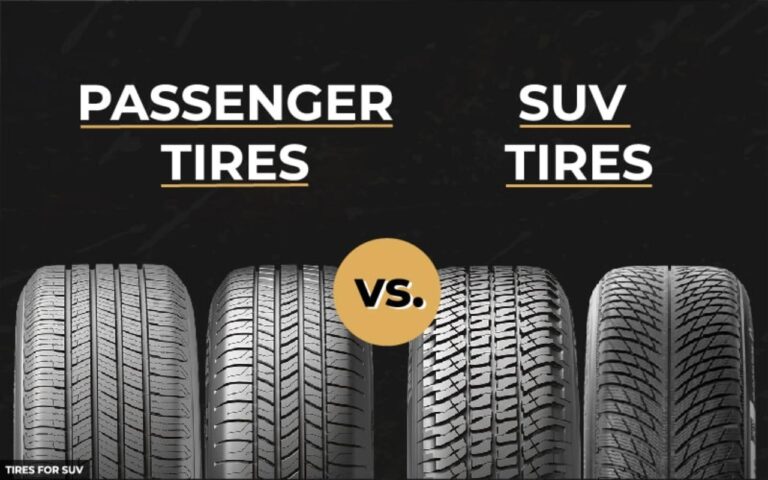Passenger tires and SUV tires are among the type of tires you can get in the market. As vehicle owners, we usually face a challenge when choosing which type of tires to purchase. I reckon that you also wonder which one works best for you, so let’s talk about it.
The differences between passenger tires and SUV tires include the construction, tread design, and design intent. Passenger tires are generally lighter compared to SUV tires. They are for carrying passengers over paved roads. SUV tires, on the other hand, are usually heavier and are built to handle various terrains.
As far as the tread design, SUV tires feature a rugged tread pattern that makes them compatible with off-road driving. However, the tread design of passenger tires aims to achieve excellent road traction even if you are accelerating your vehicle on wet surfaces.
The actual performance of these tires may also differ, including the tread wear and load capability.
Sidewall Construction Differences
What is a tire’s sidewall? This part of the tire is the one that connects the tread to the rim.
As passenger tires only accommodate lighter loads, they have shorter and thinner sidewalls.
On the other hand, SUV tires generally feature taller sidewalls to allow the tire to flex more when you are cornering or taking the off-roads. These sidewalls are also thick so that they would bear the greater weight of SUVs.
Tread Design Differences
Passenger tires commonly feature tread that allows smoother ride. They usually have either symmetrical or asymmetrical tread patterns with circumferential grooves that facilitate better water evacuation as you drive your vehicle on wet surfaces.
SUV tires commonly have an aggressive tread design. They usually have larger tread blocks which allow the tire to deliver excellent traction in off-road terrains. The rugged tread design of the SUV tires is what gives it a longer tread life.
Design Intent
As mentioned earlier, the overall design of passenger tires is for vehicles that carry lighter loads. These tires are for paved roads or well-constructed road conditions. You can’t have this tire on your car if you occasionally go off-road as you might come home with damaged tires.
However, if you drive vehicles that you intend to carry heavier loads, SUV tires are what you need. These tires are more robust compared to passenger tires due to their knobbier treads. You can be confident driving off-road with SUV tires as they usually include features that keep you safe on this particular terrain.
Tread Life
Admit it or not, but one of the primary things we want to know when purchasing new tires is their tread life. Why is it so? It is because tires with longer tread life are more economical.
So, which has longer tread life? Is it passenger tires or SUV tires?
Because of the advanced engineering put into the production of SUV tires, they are generally more durable and offer long-lasting tread life.
However, the above statement is, of course, variable. The wear of your tire’s tread depends on the terrain you frequently take. These tires also come with treadwear warranties, so I suggest looking at this warranty when you buy a new tire.
Price
So now let’s talk about the price.
Passenger tires are less expensive than SUV tires. This fact is the reason why many enthusiast drivers are interested in using them on their vehicles. This value is on top of the smoother ride that they give you if you drive on a well-paved road.
However, you must understand your tire requirement. Know the purpose of your vehicle. If you constantly carry heavy loads or occasionally take off-roads, SUV tires would be the perfect tire for you. If your car is not light enough that a passenger tire can handle, get an SUV tire.
On the other hand, if you drive on well-constructed roads with lighter loads, passenger tires are ideal as they will provide you smoother steering experience.
FAQs
What Is an LT Tire?
LT (light truck) is a category of tire. These are tires for big vehicles such as trucks and SUVs.
What is a P tire?
P stands for passenger. These are tires that go on cars and other relatively small vehicles.
Can you put SUV tires on a car?
Yes, you can. You can put SUV tires on a car as long as they fit, and the tire size is the same as the original tires that came with your vehicle.
However, SUV tires are typically bigger, have greater tread depth, and are sturdier, and passenger cars are lighter and smaller.
So, if you put SUV tires on a passenger car, the gas consumption will increase, the handling will decrease a little bit. The car may become noisier and less comfortable, speed up slower because of the heavier load.
These are disadvantages, but SUV tires can be put on a passenger car if you wish.
If you want to give it a try, make sure the size of your tire is precisely compatible. Make sure the tires fit the wheel wells and that there’s enough clearance around the vehicle’s body.
If you put SUV tires on a car and the tire size does not match up exactly to the original tire size, you can cause irreparable damage to your vehicle and put yourself in danger.
Can you put passenger tires on SUV?
Yes, it is possible to put passenger tires on an SUV.
However, this option should be made only if the vehicle is not used for heavy hauling or off-road driving.
If you plan on carrying passengers and cargo but never getting out of the urban sprawl, then you’re good with all-season or performance passenger tires.
If you drive a true SUV meant to be used as a truck replacement, go with LT tires.
If you intend to get your vehicle dirty at all, STAY AWAY from P tires! You need taller LT tires that can survive those elements. P tires are high-performance tires designed for speed and quickness, and the all-season rubber compound cannot handle wet and muddy conditions.
LT Tire Ply Rating
LT tires come in three different ply ratings.
- “C” is a 6-ply
- “D” is 8-ply
- “E” is a 10-ply
If you are transporting heavy things or traveling over unpaved terrain, you should go with the “E” rated LT tire.
Conclusion
The main differences between passenger tires and SUV tires are their engineering and their purpose.
If you are struggling to decide which one to get, I advise that you understand first what your vehicle needs based on how you are using it.

